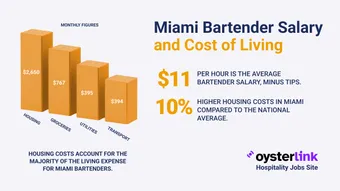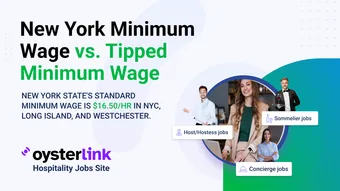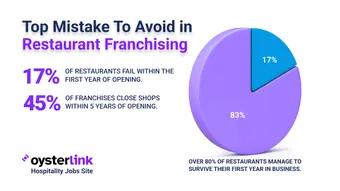So, Executive Chef vs. Head Chef: what's the real difference? In this article we look at each role closer to clarify what separates them.
Differences Between an Executive Chef and a Head Chef
Although often used interchangeably, the terms "Executive Chef" and "Head Chef" aren't the same. The Executive Chef role is focused more on the managerial aspect of running a restaurant kitchen while the Head Chef role involves more hands-on work.
The reason why there's often a mix-up between these two roles is that smaller restaurants only hire an Executive Chef or a Head Chef. Usually, they only have a Head Chef who fills the duties of both the Head Chef and the Executive Chef.
However, when both an Executive Chef and a Head Chef (or multiple Head Chefs) are employed, there's a clear distinction between them since their work covers different responsibilities.
In such scenarios, it's also common for an Executive Chef to teach Head Chefs how to prepare new dishes on the menu. The Head Chefs are then responsible for passing that knowledge onto the rest of the staff.
To make the Executive Chef vs. Head Chef distinction clearer, you can consult the table below:
In addition to these duties, Executive Chefs are responsible for high-level financial planning, including budgeting for kitchen operations, forecasting food costs and ensuring profitability. They also play a pivotal role in branding and marketing efforts, collaborating with other departments to align the culinary offerings with the restaurant's overall vision. Moreover, Executive Chefs oversee compliance with food safety regulations and standards, ensuring that all kitchen practices meet required health and safety guidelines.
What is an Executive Chef?
An Executive Chef, also called Chef de Cuisine, manages all kitchen operations. In large restaurants, they oversee multiple kitchens and manage several Head Chefs.
Their work includes coming up with new recipes, creating menus and managing all kitchen staff. What separates them from a Head Chef role is that they focus more on the administrative side of running a kitchen.
To do this, an Executive Chef needs to have strong leadership and organization skills. The role also requires years of experience working in a commercial kitchen environment.
Finally, an Executive Chef may also collaborate with other departments, such as procurement and marketing, to ensure the culinary offerings align with the restaurant's brand and business objectives. This role demands a balance of creativity, strategic planning and operational oversight to deliver a cohesive dining experience.
What is a Head Chef?
The Head Chef sits just below the Executive Chef in the kitchen hierarchy. It's the highest-ranking Chef role that is hands-on with the kitchen operations.
Their work includes managing inventory, making orders and managing or training the rest of the team.
They delegate day-to-day kitchen operation tasks as needed to their Sous Chef. However, they're always ready to step in and do any type of work when the kitchen needs them to.
The Head Chef plays a pivotal role in maintaining kitchen efficiency, ensuring that all stations operate seamlessly during service. They are also responsible for mentoring junior staff, fostering a culture of continuous improvement and upholding the establishment's culinary standards.
Skills and Qualifications Needed for Executive and Head Chefs
The skills and qualifications required for both the Executive Chef and Head Chef roles differ significantly due to the scope and responsibilities of each position. Here’s a breakdown of the key skills needed for each:
Executive Chef
- Leadership and management: Executive Chefs need strong leadership abilities to guide multiple teams across different kitchens or locations. They must have expertise in delegation, decision-making and motivating staff while fostering a positive and efficient working environment.
- Financial acumen: Executive Chefs must be adept at budgeting, cost control and profit margin analysis. They are responsible for setting menu prices, managing food costs and keeping track of overall kitchen expenses. Understanding how to balance quality with cost efficiency is essential.
- Menu development: They must have a deep understanding of food trends, dietary needs and customer preferences to create innovative, high-quality menus that drive restaurant success.
- Supplier and vendor relationships: Executive Chefs also handle relationships with suppliers, ensuring that their kitchen receives fresh ingredients at competitive prices. Negotiating contracts and maintaining inventory are key aspects of their role.
Head Chef
- Culinary expertise: Head Chefs are typically skilled Cooks with deep knowledge in various cooking techniques and kitchen operations. Their qualifications are often rooted in hands-on experience, with many having started their careers as Line Cooks or Sous Chefs.
- Kitchen management: A Head Chef needs to be highly organized, ensuring that the kitchen runs smoothly. They must manage food prep, cleanliness and ensure the staff adheres to health and safety regulations. Supervising daily operations and managing schedules are also key responsibilities.
- Team leadership: While the Executive Chef handles broader strategy, the Head Chef directly supervises the kitchen staff, making it essential for them to possess strong people skills. They should be able to train, motivate and maintain discipline within their team.
- Communication skills: Effective communication is key in a kitchen, especially during busy service hours. The Head Chef must be able to clearly delegate tasks and provide feedback to ensure the kitchen functions efficiently.
- Problem-solving: Head Chefs must be able to think on their feet, especially in fast-paced environments. Whether dealing with equipment failure, ingredient shortages or customer complaints, the ability to adapt and resolve problems quickly is essential.
Educational Requirements and Career Path
Understanding the educational and training pathways for both Executive Chefs and Head Chefs is crucial for aspiring culinary professionals. Typically, both roles require formal culinary education, such as a degree from a recognized culinary school. However, the depth and breadth of experience may differ.
Executive Chefs often have extensive experience, sometimes spanning over a decade, including time spent in leadership roles like Head Chef. This progression equips them with the necessary skills in management, menu development and operational oversight. On the other hand, Head Chefs may ascend to their position with slightly less experience but must still demonstrate exceptional culinary skills and leadership capabilities.
Career progression
- Head Chef: Often begins their career as a Line Cook or Sous Chef, gradually advancing to the role of Head Chef through hands-on experience and demonstrated culinary skills.
- Executive Chef: Generally has extensive experience, often having served as a Head Chef, with a proven track record in kitchen management, menu development and leadership.
Work Environment and Lifestyle
The work environment for Executive Chefs and Head Chefs can differ significantly. Executive Chefs often spend a considerable amount of time in administrative offices, focusing on tasks such as strategic planning, supplier negotiations and staff development across multiple locations or departments. Their role may involve travel, especially if they oversee several establishments.
In contrast, Head Chefs are predominantly found in the kitchen, leading the culinary team through hands-on supervision, cooking and immediate problem-solving during service hours. This distinction influences their lifestyle, with Executive Chefs engaging more in meetings and planning sessions, while Head Chefs experience the fast-paced, physically demanding environment of the kitchen daily.
Decision making
Executive Chefs are instrumental in shaping the culinary direction of the establishment, making strategic decisions that affect the restaurant's reputation and market positioning. They analyze market trends, customer preferences and competitive landscapes to introduce innovative concepts and menus. Conversely, Head Chefs make critical decisions during daily operations, such as adjusting recipes, managing kitchen staff dynamics and ensuring timely service, all of which directly impact customer satisfaction and operational efficiency.
Salary Expectations and Job Outlook
Understanding the compensation and employment prospects for Executive and Head Chefs can guide career decisions.
Salary Expectations
- Executive Chef: Typically commands a higher salary due to broader responsibilities, with compensation varying based on location, establishment size and experience.
- Head Chef: Earns a competitive salary, influenced by factors such as the restaurant's prestige, geographic location and individual expertise.
Job Outlook
The culinary industry anticipates steady growth, with a continual demand for skilled Chefs in diverse dining establishments. Advancement opportunities are available for those demonstrating exceptional culinary talent and leadership abilities.
Leadership Styles of Executive vs. Head Chefs
The leadership styles of Executive Chefs and Head Chefs can greatly impact the functioning of a kitchen, with each role requiring a distinct approach to management and team dynamics.
- Executive Chef: The leadership style of an Executive Chef is often more strategic and high-level, focused on managing the overall direction of the kitchen, maintaining standards across multiple stations and setting the tone for the entire culinary operation. They typically work more on long-term planning, such as menu development, budgeting and working with suppliers. An Executive Chef’s role is more about leading through vision and guidance rather than direct, daily involvement in food prep. They are the key decision-makers for the restaurant’s culinary identity and are responsible for ensuring consistency in food quality and presentation across all locations or kitchens they oversee.
- Head Chef: A Head Chef’s leadership is typically more operational and hands-on. They are responsible for managing the day-to-day kitchen operations, including supervising staff, delegating tasks, ensuring food is cooked and presented according to standards and maintaining kitchen organization. A Head Chef is more likely to be found in the kitchen, actively working alongside their team, providing direction, coaching staff and ensuring that service runs smoothly. They often deal with issues as they arise, such as adjusting for food shortages or customer complaints, while maintaining a fast-paced and efficient working environment.
The difference in leadership styles can be seen in how both roles interact with their teams. While the Executive Chef focuses on overarching strategies, the Head Chef leads through direct actions and problem-solving in real-time.
These differing leadership approaches also contribute to the overall culture of the kitchen — Executive Chefs may foster a more collaborative or creative environment, while Head Chefs often emphasize teamwork and efficiency.
Pros and Cons of Being an Executive Chef
If you think you'll enjoy managing a restaurant and making important decisions, you might be cut out to be an Executive Chef.
As an Executive Chef, you'll craft restaurant policies, conduct performance reviews and enforce establishment standards.
However, keep in mind that to land an Executive Chef job, you'll probably need at least a few years of experience in the Head Chef role.
To better understand whether this is the right role for you, we created a list of pros and cons of being an Executive Chef.
Pros and Cons of Being a Head Chef
If you like cooking and working in the kitchen better than doing administrative tasks, you may prefer to work as a Head Chef.
Like the Executive Chef role, being a Head Chef involves personnel management, but in a different way. You'll see yourself working more closely with the people you manage.
To become a Head Chef, you may first have to spend a few years in lower Chef positions or in the role of a Cook.
The pros and cons list of being a Head Chef below can help you decide whether this is the role you want to pursue.
Conclusion
Understanding the difference between an Executive Chef and a Head Chef is crucial in the culinary world. The Executive Chef drives strategy and innovation, while the Head Chef ensures flawless daily operations. Both roles are vital, and together, they create the foundation for a successful and exceptional kitchen.







